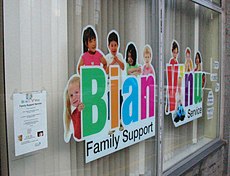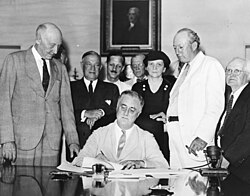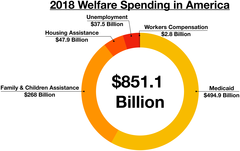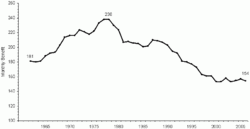Welfare
Welfare
History[edit]
Forms[edit]
- Social insurance, state-sponsored programs based partly on individual contributions towards benefits such as healthcare, unemployment payments, and old-age pensions.
- Means-tested benefits, financial assistance provided for those who are unable to cover basic needs, such as food, clothing and housing, due to poverty or lack of income because of unemployment, sickness, disability, or caring for children. While assistance is often in the form of financial payments, those eligible for social welfare can usually access health and educational services free of charge. The amount of support is enough to cover basic needs and eligibility is often subject to a comprehensive and complex assessment of an applicant's social and financial situation. See also Income Support.
- Non-contributory benefits. Several countries have special schemes, administered with no requirement for contributions and no means test, for people in certain categories of need: for example, veterans of armed forces, people with disabilities and very old people.
- Discretionary benefits. Some schemes are based on the decision of an official, such as a social worker.
- Universal or categorical benefits, also known as demogrants. These are non-contributory benefits given for whole sections of the population without a means test, such as family allowances or the public pension in New Zealand (known as New Zealand Superannuation). See also the Alaska Permanent Fund Dividend.
Social protection[edit]
By country[edit]
Australia[edit]
Canada[edit]
Denmark[edit]
Finland[edit]
India[edit]
France[edit]
Germany[edit]
Italy[edit]
Japan[edit]
Latin America[edit]
History[edit]
1980s impacts[edit]
- Argentina: Jefes y Jefas de Hogar, Asignación Universal por Hijo
- Bolivia: Bonosol
- Brazil: Bolsa Escola and Bolsa Familia
- Chile: Chile Solidario
- Colombia: Solidaridad por Colombia
- Ecuador: Bono de Desarrollo Humano
- Honduras: Red Solidaria
- Mexico: Prospera (earlier known as Oportunidades)
- Panama: Red de Oportunidades
- Peru: Juntos
Major aspects of current social assistance programs[edit]
- Conditional cash transfer (CCT) combined with service provisions. Transfer cash directly to households, most often through the women of the household, if certain conditions are met (e.g. children's school attendance or doctor visits) (10). Providing free schooling or healthcare is often not sufficient, because there is an opportunity cost for the parents in, for example, sending children to school (lost labor power), or in paying for the transportation costs of getting to a health clinic.
- Household. The household has been the focal point of social assistance programs.
- Target the poorest. Recent programs have been more successful than past ones in targeting the poorest. Previous programs often targeted the working class.
- Multidimensional. Programs have attempted to address many dimensions of poverty at once. Chile Solidario is the best example.
New Zealand[edit]
Philippines[edit]
Poland[edit]
South Africa[edit]
Spain[edit]
Sub-Saharan Africa[edit]
Sweden[edit]
United Kingdom[edit]
United States[edit]
Effects[edit]
Some opponents of welfare argue that it affects work incentives.
Perception[edit]
According to a 2012 review study, whether a welfare program generates public support depends on:[80]
- whether the program is universal or targeted towards certain groups
- the size of the social program benefits (larger benefits incentivize greater mobilization to defend a social program)
- the visibility and traceability of the benefits (whether recipients know where the benefits come from)
- the proximity and concentration of the beneficiaries (this affects the ease by which beneficiaries can organize to protect a social program)
- the duration of the benefits (longer benefits incentivize greater mobilization to defend a social program)
- the manner in which a program is administered (e.g. is the program inclusive, does it follow principles?)
See also[edit]
- Basic income
- Contingencies fund
- Economic, social and cultural rights
- Financing and benefit structure
- Human Poverty Index
- Human security
- List of countries by Social Progress Index
- List of countries by social welfare spending
- Poverty reduction
- Social democracy
- Social liberalism
- Social policy
- Social safety net
- The Four Pillars
- Welfare economics
- Welfare reform
- Welfare rights
- Welfare trap
- Workfare
Notes[edit]
References[edit]
- ^ "Social welfare program". Encyclopedia Britannica.
- ^ Brown, Taylor Kate (26 August 2016). "How US welfare compares around the globe". BBC News.
- ^ Gilles Séguin. "Welfare". Canadian Social Research. Archived from the original on 4 May 2012. Retrieved 10 February 2011.
- ^ "Social Security Versus Welfare: Differences and Similarities". e-forms.us.
- ^ "Social Security And Welfare – What Is The Difference?". www.get.com.
- ^ a b David S. Weissbrodt; Connie de la Vega (2007). International Human Rights Law: An Introduction. University of Pennsylvania Press. p. 130. ISBN 978-0-8122-4032-0.
- ^ Walker, Robert (1 November 2004). Social Security And Welfare: Concepts And Comparisons: Concepts and Comparisons. McGraw-Hill Education (UK). p. 4. ISBN 978-0-335-20934-7.
- ^ "International Labour Standards on Social security". www.ilo.org.
- ^ Frans Pennings (1 January 2006). Between Soft and Hard Law: The Impact of International Social Security Standards on National Social Security Law. Kluwer Law International B.V. pp. 32–41. ISBN 978-90-411-2491-3.
- ^ J. C. Vrooman (2009). Rules of Relief: Institutions of Social Security, and Their Impact (PDF). Netherlands Institute for Social Research, SCP. pp. 111–126.
- ^ a b c d The New Fontana Dictionary of Modern Thought Third Edition (1999), Allan Bullock and Stephen Trombley Eds., p. 919.
- ^ "Benthall, Jonathan & Bellion-Jourdan, J. The Charitable Crescent: Politics of Aid in the Muslim World, 2nd ed. (London: I.B. Tauris, 2009), p. 17". Retrieved 20 May 2020.
- ^ "Social Security History". Social Security. 28 September 2019. Archived from the original on 28 September 2019. Retrieved 28 September 2019.
- ^ United Nations, Universal Declaration of Human Rights
- ^ "Trajan". Britannica.com. Retrieved 8 November 2017.
- ^ "The Roman Empire: in the First Century. The Roman Empire. Emperors. Nerva & Trajan – PBS". Pbs.org. Retrieved 8 November 2017.
- ^ Robert Henry Nelson (2001). "Economics as religión: from Samuelson to Chicago and beyond". Penn State Press. p. 103. ISBN 0-271-02095-4
- ^ "Chapter1: Charity and Welfare", the American Academy of Research Historians of Medieval Spain.
- ^ Philip Jones (22 May 1997). The Italian City-State: From Commune to Signoria. Clarendon Press. p. 447. ISBN 978-0-19-159030-6.
- ^ Marco H. D. Van Leeuwen (31 August 2016). Mutual Insurance 1550-2015: From Guild Welfare and Friendly Societies to Contemporary Micro-Insurers. Palgrave Macmillan UK. pp. 70–71. ISBN 978-1-137-53110-0.
- ^ Bernard Harris; Paul Bridgen (6 April 2012). Charity and Mutual Aid in Europe and North America Since 1800. Routledge. p. 90. ISBN 978-1-134-21508-9.
- ^ James B. Collins; Karen L. Taylor (15 April 2008). Early Modern Europe: Issues and Interpretations. John Wiley & Sons. p. 224. ISBN 978-1-4051-5207-5.
- ^ "Benthall, Jonathan & Bellion-Jourdan, J. The Charitable Crescent: Politics of Aid in the Muslim World, 2nd ed. (London: I.B. Tauris, 2009), p. 17". Retrieved 20 May 2020.
- ^ Benthal, Jonathan. "The Qur'an's Call to Alms Zakat, the Muslim Tradition of Alms-giving" (PDF). ISIM Newsletter. 98 (1): 13.
- ^ M.A. Mohamed Salih (2004). Alexander De Waal (ed.). Islamism and its enemies in the Horn of Africa. Indiana University Press. pp. 148–149. ISBN 978-0-253-34403-8.
- ^ Fauzia, Amelia (2013). Faith and the State: A History of Islamic Philanthropy in Indonesia. Brill. p. 45-55. ISBN 9789004233973.
- ^ The Poor Laws of England Archived 5 January 2010 at the Wayback Machine at EH.Net
- ^ a b World Bank World Development Report 2019: The Changing Nature of Work. Chapter 6
- ^ Liberal Reforms at BBC Bitesize
- ^ Shorto, Russell (29 April 2009). Going Dutch. The New York Times (magazine). Retrieved: 11 June 2016.
- ^ Paul K. Edwards and Tony Elger, The global economy, national states and the regulation of labour (1999) p. 111
- ^ Ferragina, Emanuele; Seeleib-Kaiser, Martin (30 October 2011). "Thematic Review: Welfare regime debate: past, present, futures?" (PDF). Policy & Politics. 39 (4): 583–611. doi:10.1332/030557311X603592.
- ^ "More than 70 per cent of the world population lacks proper social protection". ilo.org. 3 June 2014. Retrieved 24 March 2018.
- ^ "Types of social protection". GSDRC.
- ^ "Track 2: Social Security and Social Protection: Developing Discourses". www.ilera2015.com.
- ^ Mendoza, Roger Lee (1990). The political economy of population control and retirement security in China, India and the Philippines. Philippine Economic Review, 31(2): 174–191.
- ^ a b c "History of Pensions and Other Benefits in Australia". Year Book Australia, 1988. Australian Bureau of Statistics. 1988. Archived from the original on 23 December 2014. Retrieved 23 December 2014.
- ^ Garton, Stephen (2008). "Health and welfare". The Dictionary of Sydney. Archived from the original on 15 August 2012. Retrieved 23 December 2014.
- ^ a b Yeend, Peter (September 2000). "Welfare Review". Parliament of Australia. Archived from the original on 23 December 2014. Retrieved 23 December 2014.
- ^ "National Standards and Social Programs: What the Federal Government Can Do (BP379e)". 2.parl.gc.ca. Archived from the original on 5 January 2016. Retrieved 8 November 2017.
- ^ "Government transfer payments to persons". Web.rchive.org. 4 November 2008. Archived from the original on 4 November 2008. Retrieved 8 November 2017.
- ^ Samuel Lézé, "France", in: Andrew Scull (ed.), Cultural Sociology of Mental Illness : an A-to-Z Guide, Sage, 2014, pp. 316–17
- ^ Allan Mitchell, A Divided Path: The German Influence on Social Reform in France After 1870 (1991)
- ^ Paul V. Dutton, Origins of the French welfare state: The struggle for social reform in France, 1914–1947. (Cambridge UP, 2002). online
- ^ "Federal Ministry of Family Affairs, Senior Citizens, Women and Youth". Bmfsfj.de. Retrieved 8 November 2017.
- ^ "Society". Tatsachen-ueber-deutschland.de. 15 September 2015. Retrieved 8 November 2017.
- ^ "European Welfare States – Information and Resources". Pitt.edu. Retrieved 8 November 2017.
- ^ "The Evolution of Social Policy in Japan" (PDF). Siteresources.worldbank.org. Retrieved 8 November 2017.
- ^ "ABCD" (PDF). Jcer.or.jp. Retrieved 8 November 2017.
- ^ a b Barrientos, A. and Claudio Santibanez. (2009). "New Forms of Social, Assistance and the Evolution of Social Protection in Latin America". Journal of Latin American Studies. Cambridge University Press 41, 1–26
- ^ "Home – Chronic Poverty Research Centre". Chronicpoverty.org. Retrieved 8 November 2017.
- ^ "Regeringskansliet med departementen". Regeringen.se (in Swedish). Retrieved 26 February 2010.
- ^ World Economic Forum (2019). "Mind the 100 Year Gap, 2020". Retrieved 19 January 2021.
{{cite web}}: Missing or empty|title=(help); Missing or empty|url=(help) - ^ Pringle, Keith (2011). "Comparative Studies of Well-Being in Terms of Gender, Ethnicity and the Concept of Bodily Citizenship: Turning Esping-Andersen on His Head?", in: Oleksy E , Hearn J , Golańska D (eds.): "The Limits of Gendered Citizenship: Contexts and Complexities". London: Routledge. pp. 137–156.
{{cite book}}: Missing or empty|title=(help) - ^ Hearn Jeff , Pringle Keith (2006). European Perspectives on Men and Masculinities: National and Transnational Approaches. Houndmills: Palgrave Macmillan.
{{cite book}}: Missing or empty|title=(help) - ^ Hearn Jeff , Pringle Keith , Balkmar Dag (2018). Men, Masculinities and Social Policy , in: Shaver Sheila (ed.): "Handbook of Gender and Social Policy". Oxford: Edward Elgar. pp. 55–73.
{{cite book}}:|last=has generic name (help); Missing or empty|title=(help) - ^ Pringle, Keith (2016). Doing (Oppressive) Gender via Men’s Relations with Children , in: Hayren, A, Henriksson HW (eds.): "Critical Perspectives on Masculinities and Relationalities: In Relation to What?". New York: Springer. pp. 23–34.
{{cite book}}: Missing or empty|title=(help) - ^ Rogers, Simon; Blight, Garry (4 December 2012). "Public spending by UK government department 2011–12: an interactive guide". The Guardian. Retrieved 2 April 2013.
- ^ Martin Wolf (28 October 2011). "Britain has gone climbing without a rope". The Financial Times. Archived from the original on 1 November 2010.
- ^ Loopstra, Rachel (2015). "Austerity, sanctions, and the rise of food banks in the UK" (PDF). BMJ. 350: 2. doi:10.1136/bmj.h1775. hdl:10044/1/57549. PMID 25854525. S2CID 45641347. Archived from the original (PDF) on 26 June 2015. Retrieved 25 June 2015.
- ^ Ryan, Frances (16 July 2013). "'Bedroom tax' puts added burden on disabled people". Retrieved 25 June 2015.
- ^ Katz, Michael B. (1988). In the Shadow Of the Poorhouse: A Social History Of Welfare In America. New York: Basic Books.
- ^ a b c Soss, Joe; Fording, Richard C. (2003). Schram, Sanford F. (ed.). Race and the politics of welfare reform ([Online-Ausg.]. ed.). Ann Arbor, Mich.: Univ. of Michigan Press. ISBN 978-0472068319.
- ^ "Indicators of Welfare Dependence: Annual Report to Congress, 2008". Aspe.hhs.gov. 19 April 2015. Retrieved 8 November 2017.
- ^ a b Deparle, Jason (2 February 2009). "Welfare Aid Isn't Growing as Economy Drops Off". The New York Times. Retrieved 12 February 2009.
- ^ "Ending Welfare Reform as We Knew It". The National Review. 12 February 2009. Retrieved 12 February 2009.
- ^ a b "Stimulus Bill Abolishes Welfare Reform and Adds New Welfare Spending". Heritage Foundation. 11 February 2009. Archived from the original on 1 March 2009. Retrieved 12 February 2009.
- ^ a b "Characteristics and Financial Circumstances of TANF Recipients – Fiscal Year 2010". United States Department of Health and Human Services.
- ^ Goodman, Peter S. (11 April 2008). "From Welfare Shift in '96, a Reminder for Clinton". The New York Times. Retrieved 12 February 2009.
- ^ "Revised govt formula shows new poverty high: 49.1M". Yahoo! News. 7 November 2011
- ^ "Poverty rate hits 15-year high". Reuters. 17 September 2010
- ^ Ferrara, Peter (22 April 2011). "America's Ever Expanding Welfare Empire". Forbes. Retrieved 10 April 2012.
- ^ "California lawmakers again waging political warfare over welfare". Los Angeles Times. 24 June 2012
- ^ Dawn (9 January 2014), Grants for Single Mother, Single Mother Guide, retrieved 9 January 2014
- ^ Gibson M, Thomson H, Banas K, Lutje V, McKee MJ, Martin SP, Fenton C, Bambra C, Bond L (26 February 2018). "Welfare-to-work Interventions and Their Effects on the Mental and Physical Health of Lone Parents and Their Children". Cochrane Database of Systematic Reviews. 2018 (2): CD009820. doi:10.1002/14651858.CD009820.pub3. PMC 5846185. PMID 29480555.
- ^ Bielefeld, Shelley; Harb, Jenna; Henne, Kathryn (2021-09-21). "Financialization and Welfare Surveillance: Regulating the Poor in Technological Times". Surveillance & Society. 19 (3): 299–316. doi:10.24908/ss.v19i3.14244. ISSN 1477-7487.
- ^ "Allan M. Feldman". Brown University.
- ^ Feldman, Allan M. (31 March 2017). Vernengo, Matias; Perez Caldentey, Esteban; Rosser Jr, Barkley J. (eds.). "Welfare Economics". The New Palgrave Dictionary of Economics (2nd ed.): 1–14. doi:10.1057/978-1-349-95121-5_1417-2. ISBN 978-1-349-95121-5.
- ^ "U-M Weblogin". weblogin.umich.edu. doi:10.1057/978-1-349-95121-5_1417-2. Retrieved 8 December 2021.
- ^ Campbell, Andrea Louise (11 May 2012). "Policy Makes Mass Politics". Annual Review of Political Science. 15 (1): 333–351. doi:10.1146/annurev-polisci-012610-135202. ISSN 1094-2939.
Other sources[edit]
- Blank, R.M (2001), "Welfare Programs, Economics of", International Encyclopedia of the Social & Behavioral Sciences, pp. 16426–16432, ISBN 9780080430768
- Sheldon Danziger, Robert Haveman, and Robert Plotnick (1981). "How Income Transfer Programs Affect Work, Savings, and the Income Distribution: A Critical Review", Journal of Economic Literature 19(3), pp. 975–1028.
- Haveman, R.H (2001), "Poverty: Measurement and Analysis", International Encyclopedia of the Social & Behavioral Sciences, pp. 11917–11924, doi:10.1016/B0-08-043076-7/02276-2, ISBN 9780080430768
- Steven N. Durlauf et al., ed. (2008) The New Palgrave Dictionary of Economics, 2nd Edition:
- "social insurance" by Stefania Albanesi. Abstract.
- "social insurance and public policy" by Jonathan Gruber Abstract.
- "Welfare state" by Assar Lindbeck. Abstract.
- Nadasen, Premilla, Jennifer Mittelstadt, and Marisa Chappell, Welfare in the United States: A History with Documents, 1935–1996. (New York: Routledge, 2009). 241 pp. ISBN 978-0-415-98979-4
- Samuel Lézé, "Welfare", in : Andrew Scull, J. (ed.), Cultural Sociology of Mental Illness, Sage, 2014, pp. 958–60
- Alfred de Grazia, with Ted Gurr: American Welfare, New York University Press, New York (1962)
- Alfred de Grazia, ed. Grass roots private welfare: winning essays of the 1956 national competition of the Foundation for voluntary Welfare, New York University Press, New York 1957.












.jpg)






